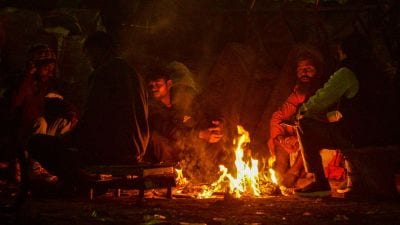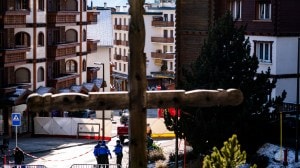Riven on the inside
History, politics and international diplomacy have been repeatedly cruel to the Palestinians. For several decades the erstwhile colonial pow...

History, politics and international diplomacy have been repeatedly cruel to the Palestinians. For several decades the erstwhile colonial powers, having divided people and territories before and after decolonisation, ignored their legitimate claims. Battered and bruised for more than thirty years and driven out of their homes 8212; ever since the Six Day War 8212; they discern no immediate silver lining. As darkness descends on the holy city of Palestine, hopes turn into despair. Patience turns into anger as the Israeli government flouts the Oslo accord without inviting the wrath of international opinion.
The major irritant is the continued construction of settlements and by-pass roads through territories that Israel still recognises as Palestinian. The Palestinian Authority is reduced to a minor player. Yasser Arafat, who has announced that he will proclaim a state on May 4, 1999, is the head of a quot;nationquot; that does not exist in reality. His credibility is low, for many in the Arab world accuse him of a quot;selloutquot;. The Al-Hamas group gathers momentum as hopes of a Palestinian state recede with every passing day.
On the other hand, Israelis have every reason to rejoice in the half century of the existence of their state. It has friends all around the world, particularly in the US and Europe where people recall, with a sense of guilt, their betrayal of the Jews during the Holocaust. You cannot convince people in, say, Amsterdam or Berlin of the just Palestinian cause.
Now the home of about one in three of the world8217;s 15 million or so Jews, the country is on the move. Its GDP per head is 17,000, putting it within striking distance of many West European countries. More importantly a state founded out of a great insult of a people sentenced to be the horrifying symbol of the foreign and cursed has survived and prospered. As David Grossman wrote in The New Yorker, quot;Israel is the only place in which a Jewish person can live with vital ingredients of the history and culture and mental life of all the generations ofJews that have preceded him, and can realise them in the creation of a new and modern realityquot;.
Fair enough. Yet Israel is today riven with disputes between the Ashkenazim western Jews and Sephardim oriental Jews, and by conflicting perceptions about the unfinished Zionist business. Tension is also mounting between the ultra-Orthodox, the inheritors of the legacy bequeathed by David Ben- Gurion, and the secularists8217; who feel uncomfortable with rabbinical authority and the rising voice and power of orthodoxy. There is a sharp cleavage between the protagonists of peace and the hardliners in different parties, including Likud, who have turned quot;national securityquot; into an obsession. Yitzhak Rabin8217;s assassination symbolised the great divide in Israeli society.
Gabriel R. Wardburg, former member of a left-wing socialist group, founding Vice-Chancellor of Haifa University and a scholar of international repute, has no individual and collective memory of the Holocaust. His family migrated from Germany wellbefore Hitler8217;s naked aggression against the Jews. But he was inspired, as were millions of fellow Jews, to return to the Promised Land and contribute his bit to the making of a nation.
Wardburg, 71, is an intellectual with a difference, though his voice of reason, once muted in Tel Aviv and Jerusalem, is much more widely heard now than ever before. He speaks slowly but firmly. When asked if Israel was an illegitimate child of British colonialism, he reminded me that the birth of Israel is the natural culmination of Zionism, which was started in the late 19th century. The British, he insisted, were nowhere in the picture until the Balfour Declaration 1917 supported its objectives.
Today nobody, not even the Arabs, question the legitimacy of the state of Israel. Wardburg is no exception. At the same time, he is candid in his criticism of some government policies. He invokes the Declaration of Independence May 15, 1948 to reiterate that Israel should treat its million Palestinian citizens 8212; almost afifth of the population 8212; as equal and not second-class citizens. What he agrees on is the need for security. In this respect, he regards the American proposal which the Palestinians have already accepted in Israel8217;s long-term strategic interest.
Though proud of its achievements, he says: quot;Israel8217;s story is unfinished, its dreams have not been realised. I hope realpolitik would force the party in power to build a just society and achieve peace. I hope Israel would be more accommodating and allow Arafat to perform his historic rolequot;.
Does he share the Palestinian anger? quot;I understand their anger. Surely, a Palestinian state can co-exist with Israelquot;.
What should the Arabs do? Wait and watch? quot;How can I pretend to speak in their name? Yes, boundaries need to be redefined. Jerusalem should remain a common city for all, Jews, Christians and Muslims, and the Arabs must have the right to govern in the regions they inhabit. We must make peace with them. Let us not be euphoric and forget either the geographicand demographic realities or the Holocaust. Above all, let us not forget what happened in Yugoslavia. It doesn8217;t take long for the bubble to burst.quot;
The point is well taken. The main issue being debated nowadays in the corridors of power is the pull-out of Israeli troops from 13.1 per cent of the West Bank. Nobody talks about the Golan Heights, the status of Palestine, the future of millions of Palestinian refugees living outside their homeland and, above all, the danger Israel may pose to the security of the Arab nations. Surely a piecemeal solution is no answer to a long-standing problem?
The hardliners, including the far-right lunatics in the cabinet, will not budge an inch. And the Binyamin Netanyahu regime, fighting for survival with his coalition partners, is unlikely to offer tangible concessions to the Arabs. So we are back to square one.
Peace talks, brokered now or later by the United States, would make sense only if religious nationalists and fundamentalists in Israel mend their ways and payheed to the warnings of scholars like Wardburg.
quot;Livingquot;, writes David Grossman, quot;means not just defending the borders of life, but also doing something about what is going on within those borders. If we don8217;t do this, in the end we will be like those suits of armour that no longer have knights inside themquot;.
Meanwhile, the land of David and Jesus Christ cries out for peace not blood.
- 01
- 02
- 03
- 04
- 05































